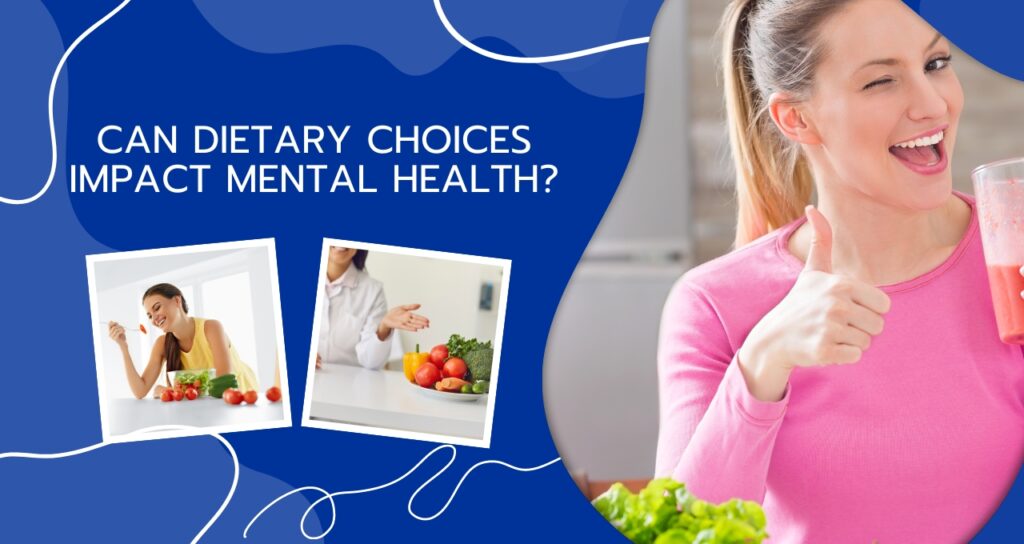We’ve all heard the saying,
“You are what you eat.”
But this goes way beyond just physical health. Turns out, the food we choose can seriously impact how we feel mentally too! This article explores the surprising link between diet and mental health and how you can use the power of food to feel your best.
The Tiny Town Inside You
Imagine a bustling city inside your belly – that’s your gut! It’s home to trillions of tiny creatures called bacteria. These little guys do more than help you digest food. They also chat with your brain through a special gut-brain connection pathway.
These gut bacteria act like factories, making important chemicals called messengers that affect your mood, sleep, and how you handle stress. When you have a good mix of friendly bacteria in your gut, they make more “happy” messengers. This can make you feel calmer, happier, and more focused.
But if your gut gets overrun with unfriendly bacteria, it disrupts the messenger production. This can lead to feelings of downness, anxiety, and even trouble thinking clearly.
How What You Eat Affects Your Gut Bugs?
The food you choose is like a VIP pass for the bacteria in your gut. Here’s how different foods impact these tiny residents and your mood:
- Sugar Crash: Sugary drinks and treats might give you a quick energy burst, but then you crash and feel even worse. This can also tip the scales in your gut, favoring unfriendly bacteria and messing with your mood.
- Inflammation Nation: Processed foods, fried stuff, and red meat can cause low-grade inflammation throughout your body, including your brain. This inflammation can mess with your brain’s work and contribute to feeling down or anxious.
- Nutrient Nibblers: Insufficient consumption of vitamins and minerals can significantly impact the production of messengers in the brain, leading to notable symptoms such as fatigue, irritability, and reduced concentration levels.
- Prebiotics and Probiotics: Prebiotics and probiotics benefit your gut health. Prebiotics act as food for the friendly bacteria in your gut, promoting their growth and strength. On the other hand, probiotics are live bacteria that reinforce your gut army. Both prebiotics and probiotics have been shown to positively impact mood, reduce anxiety, and improve cognitive function.
Fueling Your Brain for Happiness
Now that you know how food affects your gut and brain, here are some simple tips to eat for a happy mind:
- Whole Foods First: Eat unprocessed foods like fruits, veggies, whole grains, beans, and lean meats. These are packed with the nutrients your brain and gut bacteria need to thrive.
- Mediterranean Munchies: Think about adding some ideas from the Mediterranean diet to your meals. This way of eating includes lots of fruits, veggies, whole grains, healthy fats like olive oil, and fish. Studies show it can help improve mood and brain function.
- Omega-3 All-Stars: Make friends with fatty fish like salmon, tuna, and sardines. They’re rich in omega-3s, which can fight inflammation and boost your mood.
- Prebiotic Power: Eat prebiotic-rich foods like whole grains, beans, onions, garlic, and artichokes. These will keep your friendly gut bacteria happy and your mood stable.
- Fermented Friends: Consider trying fermented foods like yogurt, kimchi, sauerkraut, and kefir. These contain live bacteria (probiotics) that can further strengthen your gut army and improve your mental well-being.
- Hydration Hero: Remember to drink plenty of water! Dehydration can zap your energy, make you grumpy, and affect your focus.
Conclusion
Making small adjustments to your diet can significantly impact your gut health, emotional well-being, and overall health. A balanced diet rich in fruits and vegetables, whole grains, lean proteins, and healthy fats can help improve your digestion, reduce inflammation, and strengthen your immune system. Additionally, incorporating probiotics, prebiotics, and fermented foods can further enhance gut health and support a healthy microbiome. By taking a proactive approach to your dietary habits, you can feel your best from the inside out and enjoy long-term health benefits.

